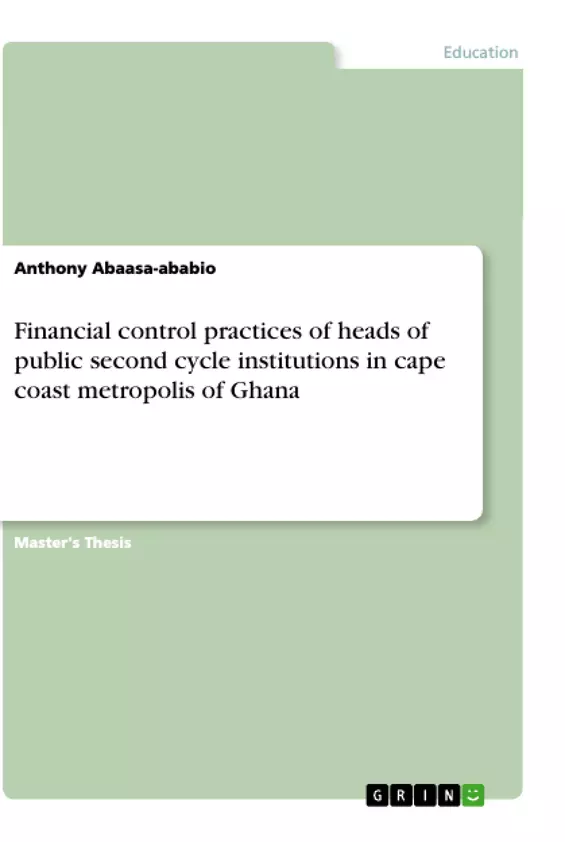This paper investigates financial control practices in public second cycle institutions in order to check whether there are possible financial irregularities in the use of school funds in the Cape Coast Metropolis. The study adopted cross-sectional survey with mixed methods design.
The findings from both the questionnaire and interview schedule showed that the school administration purchased food and used fuel very often and therefore could not maximize the resources available due to price hike. The internal controls of information technology, information and communication, control activities, and monitoring contributed positively but had weak relationships. These distortions and weaknesses may lead to misapplication, misappropriation and embezzlement of school funds. Due to limited knowledge of the heads they delegated budget preparation to the accountants. It is recommended that auditing and monitoring is routinely conducted to ensure that financial regulations are followed to avoid embezzlement, corruption and misapplication of school funds.
Inhaltsverzeichnis (Table of Contents)
- Abstract
- Introduction
- Statement of the Problem
- Research Questions
- Theoretical Framework
- Models of financial Decision-Making
- Rational Model
- Strengths and Weaknesses of Rational Model
- Political Model
- Strengths and weaknesses of Political Model
- Collegial Model
- Strengths and Weaknesses of Collegial Model
- Ambiguity Model
- Reference Model for Financial Tracking in Schools
- Tracking Function
- Financial Control and its Environment
- Effective Control of School Resources
- The Role of Heads as Financial Managers in SHS
- The Role of School Bursar/Accountant in SHS
- The Role of Other Financial Officers in SHS
- Methodology
- Results and Discussions
- Interviews with the Heads on Research Question One
- Internal Controls Analysis
- Interviews with the Heads on Research Question Four
- A Post-Hoc Comparison Test of Tukey HSD
- Findings from the Discussions
- Conclusions
- Recommendations
- Suggestions for Further Study
- REFERENCES
Zielsetzung und Themenschwerpunkte (Objectives and Key Themes)
This research aims to investigate the financial control practices in public second cycle institutions in the Cape Coast Metropolis of Ghana. The study specifically seeks to assess the effectiveness of these practices, identify potential financial irregularities, and provide recommendations for improvement.
- Financial control practices in public second cycle institutions
- Financial irregularities in the use of school funds
- Effectiveness of internal controls
- The role of school administrators in financial management
- Models of financial decision-making
Zusammenfassung der Kapitel (Chapter Summaries)
The introduction chapter outlines the context and significance of the research, defining financial control practices and emphasizing the need for effective financial management in schools. It discusses the problem of embezzlement and misapplication of funds in Ghanaian secondary schools, highlighting the importance of ensuring accountability and prudence in the use of school resources.
The theoretical framework chapter explores different models of financial decision-making, including the rational, political, collegial, and ambiguity models. Each model is discussed in terms of its strengths and weaknesses, providing a theoretical basis for understanding the financial control practices in schools.
The research methodology chapter details the mixed methods design employed in the study, outlining the data collection techniques, sampling procedures, and data analysis methods used to investigate financial control practices in public second cycle institutions in the Cape Coast Metropolis.
The results and discussions chapter presents the findings of the study, analyzing the data collected through questionnaires and interviews with school administrators. The chapter explores the relationship between internal controls and financial irregularities, and the effectiveness of various financial control measures.
Schlüsselwörter (Keywords)
The core focus of this research lies in the analysis of financial control practices in public second cycle institutions, emphasizing the role of school administrators in financial management and the impact of internal controls on financial irregularities. The study investigates the application of various models of financial decision-making within the educational context, emphasizing the importance of accountability and transparency in school resource management.
Frequently Asked Questions
What is the focus of the study in Cape Coast Metropolis?
The study investigates financial control practices and potential irregularities in public second cycle institutions (secondary schools) in Ghana.
What are the main causes of financial irregularities in these schools?
Weaknesses in internal controls, limited knowledge of school heads, and price hikes in fuel and food often lead to misappropriation or embezzlement.
Why do school heads delegate budget preparation to accountants?
Due to limited financial management knowledge, many heads rely heavily on bursars and accountants, which can create a lack of oversight.
What models of financial decision-making are discussed?
The research explores the Rational, Political, Collegial, and Ambiguity models of financial decision-making.
What are the recommendations for improving financial control?
Routine auditing and monitoring are recommended to ensure compliance with financial regulations and avoid corruption.
- Quote paper
- Anthony Abaasa-ababio (Author), 2015, Financial control practices of heads of public second cycle institutions in cape coast metropolis of Ghana, Munich, GRIN Verlag, https://www.grin.com/document/1007413



